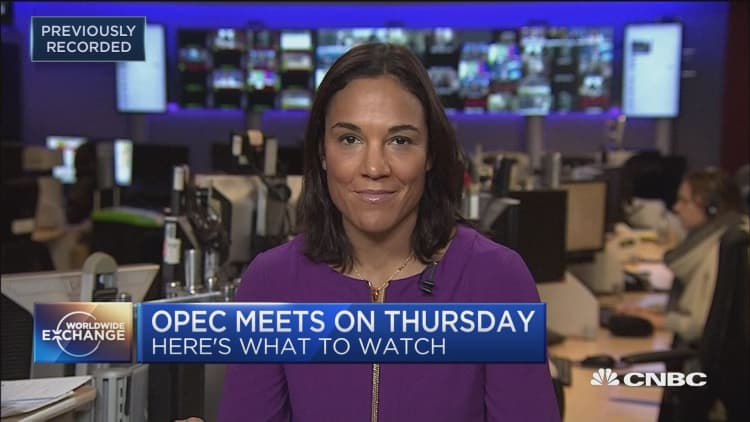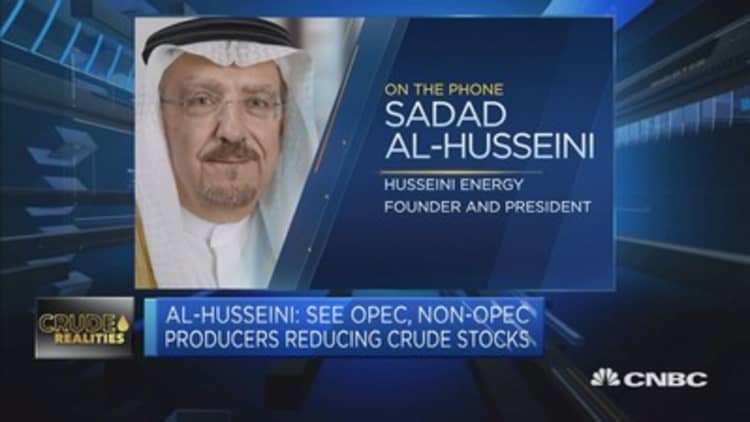Oil producers are unlikely to extend a deal to cap their output by nine months, a move that could result in a sharp pullback in prices, Citi Research analysts warned on Tuesday.
Citi made the call just two days before OPEC and other oil exporters led by Russia are due to deliver the closely watched decision in Vienna, Austria. Analysts say current oil prices reflect the market's expectation the deal will be extended through the end of next year.
"Our expectation is that something short of a nine-month extension is delivered, likely either a shorter extension or a deferral of the decision until" the first quarter of 2018, when the deal is set to expire, Citi analysts wrote in a research note on Tuesday.
If Citi's call is correct, it expects traders to liquidate their crude positions, leading to a sell-off likely to exceed the $3 per barrel swing in May when OPEC's last meeting disappointed the market.
U.S. crude performance since November 2016
Oil prices slightly extended losses on Tuesday after Reuters reported a technical committee of OPEC and other producers backed a nine-month extension to the deal, but with an option to review the agreement in June. The entire group is scheduled to discuss the accord on Thursday.
The deal to keep 1.8 million barrels a day off the market has helped drain a global glut of crude oil and boost prices to 2½-year highs. However, the 14-member OPEC cartel and its partners have not yet achieved their goal of driving down the world's stockpile levels to the five-year average.
Citi says it believes top producers Saudi Arabia and Russia are not yet in agreement over a nine-month extension. Doubts about Russia's resolve, fueled by protests from Russian oil giants, have undercut the market's confidence in the extension this week.
Russia's domestic policy is the biggest stumbling block to locking down the extension, Citi says. In the bank's view, the Russian central bank worries that higher oil prices could cause the Russian ruble to gain in value, potentially denting economic growth.

But Citi also says the case for an extension through 2018 has been diminished now that international benchmark futures have risen above OPEC's target price of $60 a barrel. OPEC projects crude stockpiles in developed nations will fall to their five-year average by the third quarter, diminishing the need for a full-year extension, Citi notes.
"This means that significant Saudi corralling is likely to be needed in order to get a full nine-month extension done," the Citi analysts wrote.
"A nine-month extension is clearly a viable option, but the Saudis will likely need to be at their persuasive best in order to get support from Russia and other OPEC members."
Saudi Arabia needs oil prices to remain high because it is embarking on domestic reforms that require public support and preparing to sell shares in a portion of its state oil giant, according to Citi.

Countries that rely heavily on oil revenue are concerned that supply from non-OPEC producers such as the United States will ramp up as prices rise, leading to another bout of oversupply and eventually a crash in prices, Citi says.
A nine-month extension would give U.S. shale drillers the chance to capture more of Russia and Saudi Arabia's market share while they're limiting production, Citi says. U.S. exports have recently hit records as drillers fill the gap left by countries participating in the production cuts.
Citi says American drillers are aggressively locking in prices for future deliveries to customers, rapidly getting their finances in order, and can now break even when crude trades at roughly $40 a barrel. The bank argues that an extension through 2018 may be "too good an opportunity for them to pass up."


